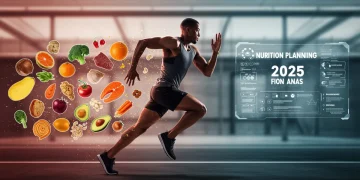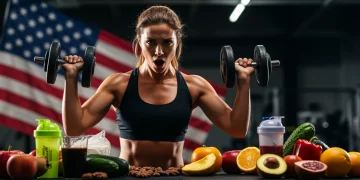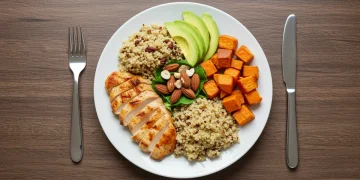Plant-Based Power: High-Protein Vegan Recipes for Muscle & Recovery
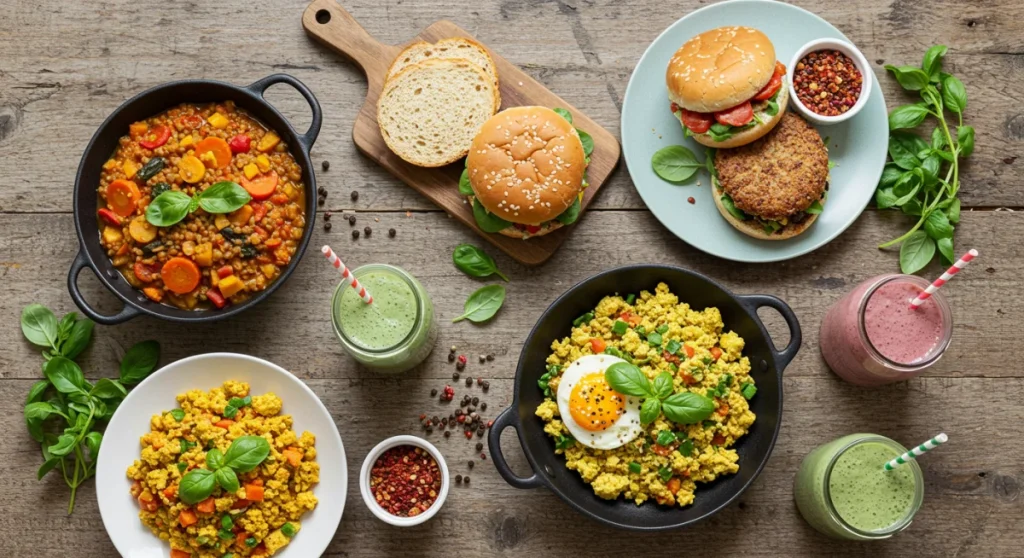
Achieving optimal muscle gain and recovery on a vegan diet is entirely possible with a strategic approach to nutrition, focusing on diverse protein sources and nutrient-dense meals.
Welcome to the future of fitness nutrition! In 2025, the landscape of athletic performance is increasingly embracing plant-based diets, recognizing their profound benefits for both health and environmental sustainability. This article will explore Plant-Based Power: 8 High-Protein Vegan Recipes for Muscle Gain and Recovery in 2025, Backed by Nutritional Science, providing you with the culinary tools to fuel your body effectively and deliciously.
The Scientific Edge of Plant-Based Protein for Athletes
For years, a common misconception persisted that plant-based diets struggled to provide sufficient protein for muscle development and repair. However, modern nutritional science unequivocally debunks this myth. Plants offer a rich and diverse array of protein sources, often accompanied by a wealth of beneficial micronutrients, fiber, and antioxidants that are crucial for overall health and athletic performance. The key lies in understanding how to combine these sources effectively to ensure a complete amino acid profile.
Beyond just protein content, plant-based diets have been shown to reduce inflammation, improve gut health, and enhance recovery times. Athletes transitioning to or optimizing a vegan diet often report increased energy levels and a reduced incidence of muscle soreness. This holistic approach to nutrition supports not just muscle building but also the foundational health that underpins sustained athletic excellence.
Understanding Complete Proteins in a Vegan Diet
While animal proteins are often lauded as “complete” because they contain all nine essential amino acids, many plant-based foods also offer a full spectrum, or can be easily combined to achieve it. This understanding is fundamental for anyone looking to maximize muscle gain and recovery on a vegan diet.
- Quinoa: A grain that stands out as a complete protein, offering all essential amino acids.
- Soy Products: Tofu, tempeh, and edamame are excellent complete protein sources, versatile in many dishes.
- Buckwheat: Another complete protein, often used in porridges or as a side dish.
- Combining Plant Proteins: Pairing foods like beans with rice, or hummus with whole-wheat pita, creates a complete amino acid profile.
The synergy of different plant foods ensures that your body receives all necessary building blocks for muscle synthesis and repair. This strategic combination is what gives plant-based athletes a significant advantage, providing not only protein but also a broad spectrum of phytonutrients that support recovery and reduce oxidative stress.
In essence, embracing plant-based protein means adopting a more diverse and nutrient-rich diet. This diversity is not just beneficial for muscle protein synthesis but also for countless other physiological processes that contribute to peak athletic condition. The scientific community continues to uncover the extensive benefits, making plant-based eating a powerful tool for athletes.
Recipe 1: Power-Packed Lentil and Quinoa Chili
This hearty chili is a powerhouse of plant-based protein and fiber, perfect for refueling after an intense workout. Lentils and quinoa together form a complete protein, while the array of vegetables provides essential vitamins and minerals for recovery and overall well-being. It’s also incredibly versatile, allowing you to adjust the spice level and add your favorite toppings.
This recipe is designed for maximum nutritional impact, ensuring that every spoonful contributes to your muscle-building and recovery goals. The slow cooking process allows the flavors to meld beautifully, creating a satisfying and comforting meal that you’ll look forward to.
Ingredients for Optimal Nutrition
Each ingredient in this chili is carefully selected for its nutritional benefits, contributing to a balanced and effective recovery meal.
- Brown Lentils: High in protein, fiber, and iron, crucial for energy and muscle repair.
- Quinoa: A complete protein with a good balance of amino acids, and rich in magnesium.
- Black Beans: More protein and fiber, plus folate and potassium for muscle function.
- Tomatoes: Packed with lycopene, an antioxidant, and Vitamin C for immune support.
- Bell Peppers & Onions: Provide a range of vitamins and antioxidants to combat inflammation.
To prepare, sauté onions and bell peppers, then add garlic, diced tomatoes, vegetable broth, cooked lentils, quinoa, and black beans. Simmer for at least 30 minutes, allowing the flavors to deepen. Season with chili powder, cumin, and a pinch of cayenne for a kick. This chili is not only delicious but also an excellent meal prep option, as it tastes even better the next day.
The combination of complex carbohydrates from quinoa and lentils with the high protein content ensures sustained energy release and efficient muscle repair. This recipe exemplifies how flavorful and nutritionally dense plant-based meals can be, proving that you don’t need animal products to achieve your fitness goals.
Recipe 2: Spicy Black Bean and Corn Burgers with Avocado Cream
These flavorful black bean and corn burgers are not only delicious but also packed with protein and fiber, making them an ideal meal for muscle recovery. The avocado cream adds healthy fats and a creamy texture, enhancing both taste and nutrient absorption. They are a fantastic alternative to traditional burgers, offering a satisfying and wholesome experience.
Crafting these burgers allows for creativity in seasoning, ensuring they cater to your palate while delivering essential nutrients. They are relatively easy to make in bulk, perfect for meal prepping and having healthy options readily available throughout the week.
Building a Better Vegan Burger
The key to a great vegan burger lies in the balance of texture and flavor, alongside a robust nutritional profile. This recipe achieves both through thoughtful ingredient choices.
- Black Beans: The foundation, providing protein, fiber, and structure.
- Corn: Adds sweetness and a pleasant texture, along with vitamins.
- Breadcrumbs: Helps bind the burger and contributes to a firm texture.
- Spices (Cumin, Chili Powder): Elevate the flavor profile, making the burger exciting.
- Avocado: Rich in monounsaturated fats, which are excellent for heart health and inflammation.
Mash cooked black beans, then mix with corn, breadcrumbs, finely diced onion, garlic, and spices. Form into patties and bake or pan-fry until golden brown. For the avocado cream, simply blend ripe avocado with lime juice, cilantro, and a pinch of salt. Serve on whole-grain buns with your favorite toppings. This recipe offers a fulfilling and nutritionally complete meal, supporting muscle repair and providing sustained energy.
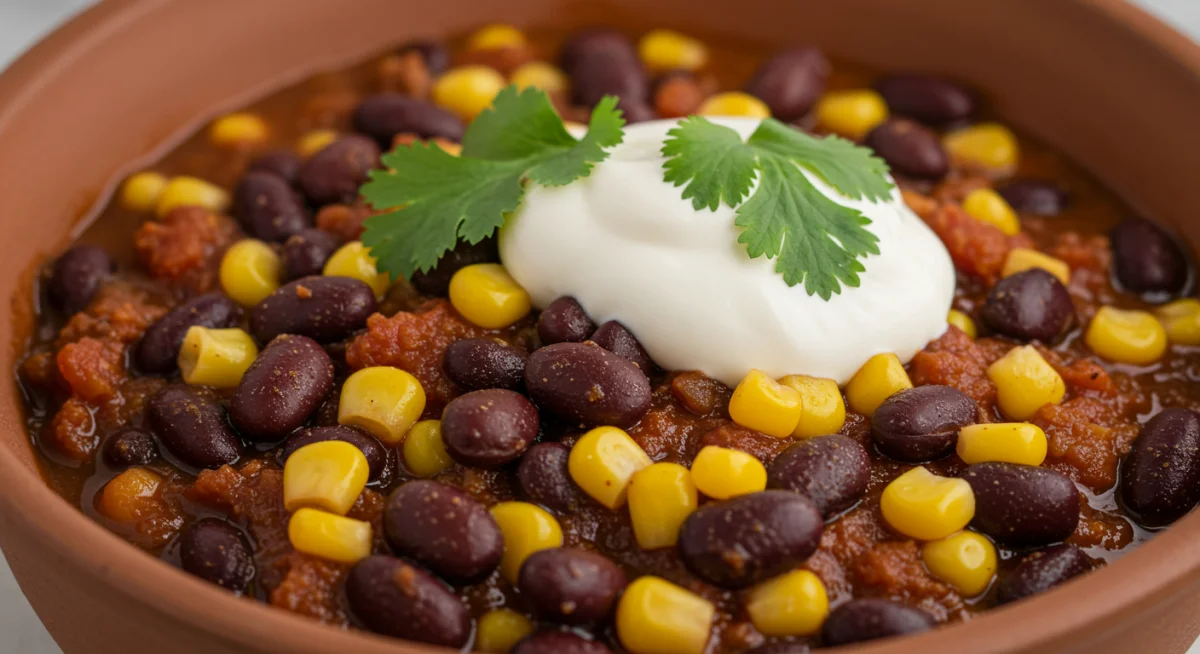
The combination of complex carbohydrates, fiber, protein, and healthy fats in these burgers makes them an excellent choice for athletes. They provide the necessary fuel for recovery without the heavy feeling often associated with meat-based meals, embodying the essence of High-Protein Vegan Recipes.
Recipe 3: Tofu Scramble with Spinach and Nutritional Yeast
Start your day with a protein-rich bang with this delicious tofu scramble. It’s a fantastic alternative to eggs, providing a substantial amount of protein from tofu, iron from spinach, and a cheesy flavor from nutritional yeast. This meal is quick to prepare, making it ideal for busy mornings, and it sets a strong foundation for muscle recovery and energy throughout the day.
The versatility of tofu allows it to absorb flavors remarkably well, making this scramble a delightful and customizable dish. It’s not just a breakfast item; it can also serve as a light lunch or a post-workout snack, offering consistent protein intake.
Key Ingredients for a Nutritious Scramble
Every component in this scramble plays a role in delivering essential nutrients, making it a powerful start to any day.
- Firm Tofu: The primary protein source, excellent for muscle repair.
- Spinach: Rich in iron, vitamins K and A, and antioxidants, crucial for overall health.
- Nutritional Yeast: Provides a cheesy flavor profile and a significant amount of B vitamins, including B12 (if fortified).
- Turmeric: Adds color and boasts anti-inflammatory properties, aiding recovery.
- Black Salt (Kala Namak): Imparts an authentic eggy flavor, enhancing the experience.
Crumble firm tofu into a pan with a little oil. Sauté with onions and garlic until lightly browned. Add spinach, turmeric, nutritional yeast, and black salt. Cook until spinach is wilted and the tofu is heated through. Serve with whole-grain toast or alongside roasted vegetables for an even more fulfilling meal. This scramble is a testament to how flavorful and satisfying plant-based breakfasts can be, truly embodying the spirit of High-Protein Vegan Recipes.
The high protein content ensures satiety and supports muscle protein synthesis, while the other ingredients contribute to a robust micronutrient profile. This breakfast option is not only delicious but also strategically designed to support an active lifestyle and recovery needs.
Recipe 4: Creamy Peanut Butter Protein Smoothie
When time is of the essence, a creamy peanut butter protein smoothie is your best friend for quick muscle recovery and a protein boost. This recipe combines the satiating power of peanut butter with a plant-based protein powder, ensuring a complete amino acid profile. It’s an ideal post-workout drink or a convenient meal replacement on the go, providing sustained energy and supporting muscle repair.
Smoothies are an excellent vehicle for packing a lot of nutrients into one easy-to-consume format. This particular blend is designed to be both delicious and highly effective for athletic recovery, making it a staple for anyone focused on fitness.
Ingredients for Maximum Recovery
Each ingredient is chosen to maximize protein intake and aid in rapid recovery, making this smoothie a nutritional powerhouse.
- Plant-Based Protein Powder: Choose a blend of pea, rice, or hemp protein for a complete amino acid profile.
- Peanut Butter: Provides healthy fats, additional protein, and a rich, creamy texture.
- Banana: Offers natural sweetness, potassium (important for muscle function), and complex carbohydrates for energy.
- Almond Milk (or other plant milk): The liquid base, adding calcium and a smooth consistency.
- Chia Seeds: A source of omega-3 fatty acids, fiber, and a small amount of protein.
Blend all ingredients until smooth and creamy. Adjust the consistency by adding more plant milk if desired. This smoothie is not only incredibly easy to make but also highly effective in delivering the necessary macro and micronutrients for optimal recovery and muscle growth. It’s a testament to how simple and effective High-Protein Vegan Recipes can be.
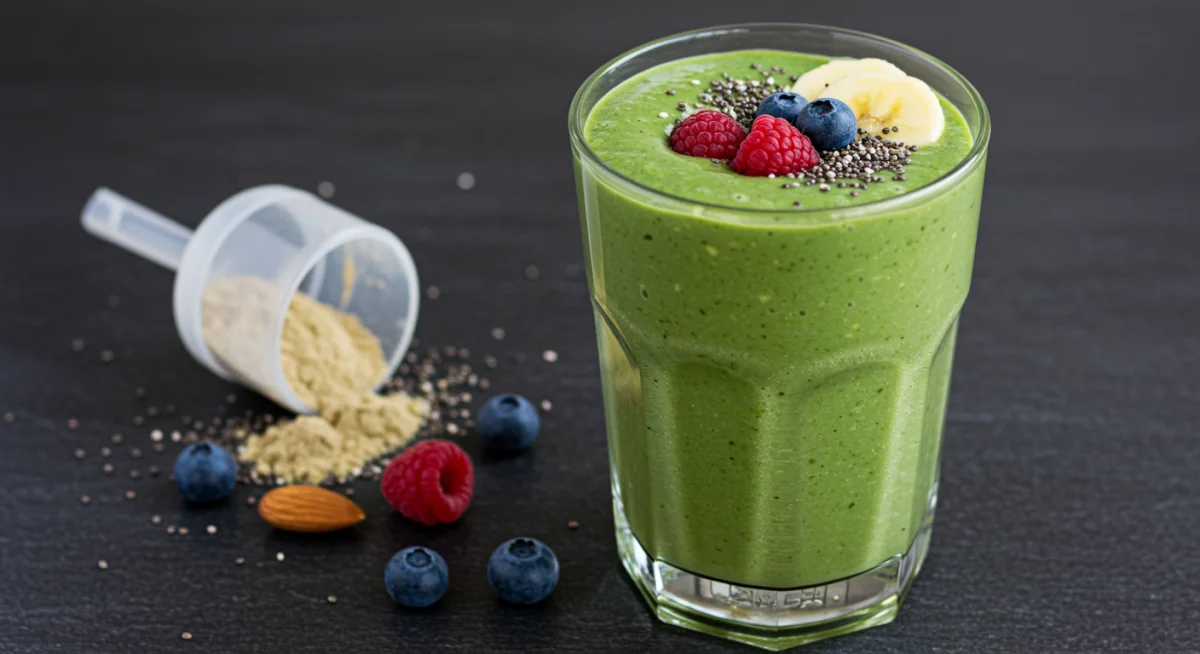
The rapid absorption of nutrients from a smoothie makes it particularly beneficial immediately after exercise, helping to kickstart the recovery process and replenish glycogen stores efficiently.
Recipe 5: High-Protein Tofu and Vegetable Skewers
These tofu and vegetable skewers are a delightful and visually appealing way to incorporate significant plant-based protein into your diet. Marinated tofu cubes, grilled alongside colorful vegetables, offer a complete protein meal that’s low in saturated fat and rich in antioxidants. They are perfect for grilling season or baking in the oven, providing a versatile option for any time of year.
Skewers are an excellent way to ensure a balanced intake of protein and vegetables in each bite. The marinade is key to infusing flavor into the tofu, making it an irresistible part of your meal plan.
Crafting Flavorful and Nutritious Skewers
The selection of ingredients and the marinating process are crucial for creating skewers that are both delicious and nutritionally beneficial.
- Extra-Firm Tofu: Pressed and cut into cubes, it’s a protein-packed base that absorbs marinades well.
- Bell Peppers: Offer a variety of colors and vitamins, particularly Vitamin C.
- Zucchini and Red Onion: Add texture, flavor, and additional micronutrients.
- Soy Sauce/Tamari, Maple Syrup, Ginger, Garlic: Form a delicious marinade that adds depth of flavor.
Press the tofu to remove excess water, then cut into cubes. Marinate the tofu and chopped vegetables in a mixture of soy sauce, maple syrup, grated ginger, and minced garlic for at least 30 minutes. Thread onto skewers and grill or bake until the tofu is golden and the vegetables are tender-crisp. These skewers serve as a fantastic main course, proving that High-Protein Vegan Recipes can be both elegant and satisfying.
The combination of protein from tofu and a wide range of vitamins and minerals from the vegetables makes these skewers an excellent choice for a balanced meal that supports muscle growth and overall health. They are light yet filling, perfect for a healthy and active lifestyle.
Recipe 6: Hearty Chickpea and Vegetable Curry
A warm bowl of chickpea and vegetable curry is the epitome of comfort food that also delivers a substantial protein punch. Chickpeas are a stellar source of plant-based protein and fiber, making this curry incredibly filling and beneficial for digestive health. Combined with a medley of vegetables and aromatic spices, this dish becomes a vibrant and nutrient-dense meal perfect for recovery and sustained energy.
Curries are celebrated for their ability to incorporate a wide variety of vegetables and legumes, ensuring a broad spectrum of nutrients. This recipe is particularly good for meal prepping, as the flavors deepen over time, making leftovers even more enjoyable.
The Nutritional Power of Curry
The ingredients in this curry are chosen for their synergistic nutritional benefits, contributing to a meal that supports both muscle and general well-being.
- Chickpeas: High in protein, fiber, and complex carbohydrates, providing sustained energy.
- Coconut Milk: Adds creaminess and healthy fats, which can aid in nutrient absorption.
- Spinach and Sweet Potatoes: Rich in vitamins, minerals, and antioxidants, supporting recovery and immune function.
- Curry Powder and Turmeric: Provide anti-inflammatory properties and a rich flavor profile.
Sauté onions, garlic, and ginger, then add curry powder and turmeric. Stir in diced sweet potatoes, chickpeas, vegetable broth, and coconut milk. Simmer until sweet potatoes are tender, then stir in fresh spinach until wilted. Serve hot with brown rice or quinoa for a complete and satisfying meal. This hearty curry showcases how delicious and effective High-Protein Vegan Recipes can be for maintaining an active lifestyle.
The complex carbohydrates and protein work together to replenish energy stores and repair muscle tissue, while the anti-inflammatory spices help to reduce post-exercise soreness. This curry is a complete meal in itself, offering everything your body needs for optimal function.
Recipe 7: Mediterranean Quinoa Salad with Roasted Vegetables
This Mediterranean quinoa salad is a vibrant and refreshing dish, bursting with flavors and packed with plant-based protein. Quinoa, a complete protein, is combined with roasted vegetables, olives, and a lemon-herb dressing to create a meal that is both light and incredibly satisfying. It’s perfect for a healthy lunch, a side dish, or a post-workout meal, offering a wealth of nutrients for recovery.
The beauty of this salad lies in its freshness and the balance of textures and flavors. It’s an excellent way to incorporate a variety of vegetables into your diet, ensuring a broad intake of vitamins and minerals.
Ingredients for a Balanced and Flavorful Salad
Each component of this salad contributes to its nutritional value and delicious taste, making it a standout among High-Protein Vegan Recipes.
- Quinoa: The protein-rich base, also high in fiber and minerals.
- Cherry Tomatoes, Cucumbers, Bell Peppers: Provide hydration, vitamins, and antioxidants.
- Kalamata Olives: Add healthy fats and a briny flavor.
- Red Onion and Fresh Herbs (Parsley, Mint): Enhance flavor and freshness.
- Lemon-Herb Dressing: A simple blend of lemon juice, olive oil, dried oregano, and garlic powder for a zesty finish.
Cook quinoa according to package directions and let it cool. Roast chopped bell peppers and zucchini until tender. In a large bowl, combine the cooled quinoa, roasted vegetables, chopped cherry tomatoes, cucumbers, red onion, and Kalamata olives. Whisk together lemon juice, olive oil, dried oregano, and garlic powder for the dressing, then toss with the salad. Garnish with fresh parsley and mint. This salad is a testament to how delicious and versatile plant-based meals can be, supporting muscle repair and overall vitality.
The combination of complex carbohydrates from quinoa and the healthy fats from olives and olive oil provides sustained energy and supports cellular health. This salad is a powerhouse of nutrients, perfectly suited for an active lifestyle.
Recipe 8: High-Protein Vegan Shepherd’s Pie
This comforting vegan shepherd’s pie is a hearty and satisfying meal that delivers a significant amount of plant-based protein, making it an excellent choice for muscle gain and recovery. A rich lentil and mushroom base, topped with creamy mashed sweet potatoes, offers a nutrient-dense and flavorful experience. It’s a perfect dish for colder evenings or when you need a substantial meal to refuel your body.
The layers of this pie provide a delightful combination of textures and flavors, making it a family favorite. It’s a classic comfort food reimagined with a plant-based twist, proving that vegan meals can be just as robust and fulfilling.
Building a Nutritious and Satisfying Pie
The thoughtful selection of ingredients ensures this shepherd’s pie is not only delicious but also packed with everything your body needs for recovery.
- Green or Brown Lentils: The primary protein source for the base, also rich in fiber.
- Mushrooms: Add umami flavor and additional vitamins and minerals.
- Carrots, Peas, Celery: Contribute essential vitamins, minerals, and fiber.
- Sweet Potatoes: The creamy topping, providing complex carbohydrates, Vitamin A, and potassium.
- Vegetable Broth and Herbs: Create a flavorful and aromatic gravy for the filling.
Sauté onions, carrots, and celery, then add mushrooms and cook until softened. Stir in cooked lentils, vegetable broth, and herbs (like thyme and rosemary). Simmer to thicken. For the topping, boil and mash sweet potatoes with a splash of plant milk and a pinch of salt. Pour the lentil mixture into a baking dish, top with mashed sweet potatoes, and bake until golden brown and bubbly. This shepherd’s pie is a perfect example of how High-Protein Vegan Recipes can be both comforting and incredibly nutritious, supporting your fitness goals with every bite.
The combination of complex carbohydrates from sweet potatoes and the high protein content from lentils ensures sustained energy and efficient muscle repair. This dish is designed to satisfy and nourish, making it an ideal meal for active individuals.
| Key Recipe | Primary Benefit |
|---|---|
| Lentil & Quinoa Chili | Complete protein for sustained energy and muscle repair. |
| Tofu Scramble | Quick, high-protein breakfast for morning fuel and recovery. |
| Peanut Butter Smoothie | Rapid post-workout recovery with protein and healthy fats. |
| Chickpea Curry | Hearty meal for sustained energy and comprehensive nutrient intake. |
Frequently Asked Questions About Vegan Protein
Absolutely. By consuming a varied diet rich in legumes, grains, nuts, seeds, and soy products, vegans can easily meet their protein requirements for muscle growth and repair. Many plant foods, or combinations thereof, provide all essential amino acids necessary for muscle protein synthesis.
Excellent plant-based protein sources include lentils, chickpeas, black beans, quinoa, tofu, tempeh, edamame, seitan, nutritional yeast, and various nuts and seeds like almonds, peanuts, chia seeds, and hemp seeds. Incorporating a mix of these ensures a complete amino acid profile.
While some plant foods like quinoa and soy are complete proteins on their own, combining different plant protein sources throughout the day (e.g., rice and beans, hummus and whole-wheat bread) ensures you get all essential amino acids. The body stores amino acids, so they don’t need to be consumed in the same meal.
Yes, plant-based protein powders derived from pea, rice, hemp, or a blend of these can be highly effective for muscle gain. They offer a convenient way to increase protein intake, particularly around workouts, and can contribute to meeting daily protein targets, supporting recovery and growth.
Beyond protein, carbohydrates are crucial for replenishing glycogen stores, and healthy fats support hormone production and reduce inflammation. Micronutrients like iron, zinc, magnesium, and vitamins B and D are also vital for energy metabolism and overall recovery. A diverse whole-food vegan diet typically provides these abundantly.
Conclusion
Embracing a plant-based diet for muscle gain and recovery is not just a trend; it’s a scientifically supported and sustainable approach to athletic nutrition. The High-Protein Vegan Recipes presented here demonstrate the incredible versatility and nutritional density that plant foods offer. From hearty chilis and flavorful burgers to quick smoothies and comforting pies, these dishes provide all the essential macronutrients and micronutrients needed to fuel your workouts, repair muscle tissue, and optimize your overall health. By focusing on diverse plant protein sources and understanding their synergistic benefits, athletes can achieve their fitness goals while enjoying delicious, wholesome meals. The future of peak performance is undoubtedly green, offering a path to strength, resilience, and sustained well-being for all.
